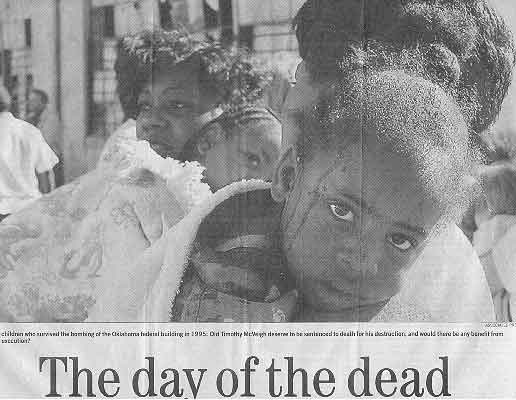Conspiracy or not, a judge ruled last week that Timothy McVeigh would die
by lethal injection today. As the assistant police chief in Terre Haute, Indiana,
said, 'We're in execution mode again."
This is the first U.S. federal execution since 1963 and, to borrow a vaudevillian
phrase, "What an execution it will be!" Banking that no higher court
would halt it, hucksters scrambled to reassemble their wares - buttons and other
trinkets to be flogged and new T-shirts to be printed. The T-shirt, which earlier
bore a picture of a syringe and the words: "Hoosier Hospitality. McVeigh
/ Terre Haute / May 16, 2001, Final Justice," features a new date. Computer
hackers frantically sought ways to access the closed-circuit broadcast of the
killing, set up for survivors of the Oklahoma bombing and relatives of those
who died. Grocers in the quiet Midwest town placed fresh orders for sandwiches
to feed the anticipated crowd. Officials designated two parks for expected protesters:
One for those applauding the execution and the other, a few blocks away, for
those opposing it.
McVeigh's was a heinous crime that left 168 dead, including 19 children
he dismissed as "collateral damage." Those who survived talk of limbs
chopped off and other horrors; while those severely brain injured still lie
helpless, unable even to tell their stories. This is victim impact of such a
magnitude that the most severe punishment is clearly, unarguably justified.
That's what has made the controversy about the nature of McVeigh's punishment,
along with the hullabaloo over who should be allowed to watch, so intriguing.
Many of the survivors, victims' relatives and friends and those declared "secondary
victims" petitioned U.S. Attorney General John Ashcroft for their right
to witness the execution. Having been thoroughly immersed in the doctrine of
the grief counsellors who have swarmed around Oklahoma City since the explosion
five years ago, they contended that only by watching could they achieve healing
of their emotional pain.
Ashcroft, having accepted the popular notion of finding "closure,"
agreed to provide a private screening to this select audience. Unhappy with
this limitation, Entertainment Network sought court permission to publicly broadcast
the execution, but the request was turned down. So, the public must rely on
hackers.
Why is there all this interest in watching a man be put to death? How can
it benefit anyone? For the survivors and relatives, what can it accomplish?
While "closure" may be their announced motive, the private reason,
I suspect, is raw vengeance. And, while Homer wrote that vengeance is "sweeter
than honey," I doubt that will be in this case. What would they feel if,
as he is still very likely to do, McVeigh claims "victory at 168 to 1,"
and quotes Henley's powerful lines: "I am the master of my fate, I am the
captain of my soul"? Would they be satisfied to watch him then drift into
a tidy, bloodless death? The experience might very well turn out too bitter
to swallow.
And what about the rest of us? What would we get out of watching? Likely,
the answer depends on where we stand on the death penalty and on our attitude
about victim rights. During McVeigh's trial, many of the victims, understandably,
felt he should pay with his life. During the sentencing phase, a Time/ CNN poll
indicated that 78 per cent of Americans thought he should die. On the first
day, when a honk in front of the courthouse was meant to signal that he should
"fry," more than 24,000 citizens honked their horns. One man even
displayed a billboard carrying a caricature of McVeigh with dynamite sticks
wedged into his ears and mouth, hands holding lit matches and the caption: "Let
Us Have Him."
With this thirst for a lynching, McVeigh's quiet execution is unlikely to
be quenching. Decapitation, hanging, even the old electric chair would, I reckon,
be more satisfying for those who cry for blood. But people such as Bud Welch,
who, though his daughter died in the bombing, opposes the death penalty, are
likely to react quite differently. Welch admits that initially he had a strong
urge for retribution, but then realized that killing McVeigh would bring no
emotional relief.
Having met with McVeigh's father, he thinks that killing another man's child
is wrong, no matter what. And even before the death sentence was rendered, Archbishop
Charles Chaput was trying to get this point across. "Killing the guilty
is wrong ... while it may satisfy society's anger for a while, it cannot release
the murder victim's loved ones from their sorrow."
Perhaps we should not only be allowed, but required, to watch the execution.
Whether it heals or hurts, satisfies or sickens, we ought to witness this extreme
act of the state on behalf of its citizens, for then we would have knowledge
of what we speak. Jim Willett has done just that. As the warden at Huntsville
Prison, he is the overseer of all Texas executions. Last year, he witnessed
50. In an interview with National Public Radio, he revealed that "there
are times when I'm standing there, watching those fluids start to flow, wondering
if what we are doing is right. It's something I'll think about for the rest
of my life."
If we were all obliged to watch McVeigh's execution, we might find ourselves
also asking if it is "right." But in this era in which personal feelings
so often have primacy over moral principles, it seems disturbingly possible
that the question would be swept aside by the cry for blood.


